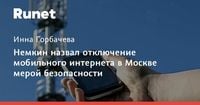In Moscow, internet shutdowns are planned for the May holidays for security reasons, as announced by the Russian System for the Prevention and Liquidation of Emergency Situations (RSChS). The shutdown is expected to take place from May 7 to May 9, 2025, coinciding with the Victory Day celebrations. Many residents of the capital perceive this as an additional unplanned weekend in the digital space.
The primary reason for the restrictions is to ensure security during mass celebrations, particularly during the Victory Day parade on May 9 and other festive events. The practice of temporarily restricting access to mobile internet and communications is becoming increasingly common not only in Moscow but also in other regions of Russia, especially during events that involve high-ranking officials. In modern conditions, the shutdown of mobile internet and communications is considered a necessary measure to prevent potential security threats.
Cellular communication can be used to coordinate illegal activities, as well as for remote control of technical devices that pose a danger. Temporarily shutting down the network significantly reduces opportunities for organizing provocations and potential attacks. The practice of temporary internet shutdowns is becoming a standard procedure during major events in the capital, although the appropriateness of such measures remains a subject of public discussion.
Shutdowns usually occur during specific hours that coincide with rehearsals or the events themselves. For instance, reports indicate that on May 7, the mobile internet will be shut down from 08:00 to 12:30, and on May 9, from 08:00 to 14:00. During these periods, only voice communication in the 3G band will be available in the city, making it impossible to use mobile applications, including taxi services. This means that calling a taxi will only be possible through traditional dispatch services, as aggregators will not be able to transfer orders to drivers.
Residents have already begun experiencing disruptions in mobile communications, with complaints reported from major operators such as T2, MTS, Beeline, Megafon, and Yota. The main flow of complaints came from the city center, where a rehearsal for the air part of the parade was taking place. On May 5, users reported a shutdown of mobile internet and communications from all major mobile operators, approximately from 11:00 to 12:00, with many noting problems accessing the internet and messaging services.
Anton Nemkin, a member of the State Duma Committee on Information Policy, emphasized that the shutdown of mobile internet during mass events is necessary for preventing potential threats and ensuring the safety of citizens. He stated, "In the conditions of modern hybrid warfare, even communication channels can be used as means of military control, and therefore temporary restrictions are a justified measure." He reassured citizens that Wi-Fi access would still be available, which would help mitigate some inconveniences.
Despite the temporary inconveniences, the measures are considered necessary in conditions of increased risk during mass events. Many experts believe that maintaining a balance between security and citizens' rights to access information is crucial. The law regarding the "sovereign internet," adopted in 2019, provides for the possibility of centralized network management in case of threats to the integrity, stability, and security of the Russian segment of the internet.
According to official reports from the RSChS, restrictions on internet access are introduced to ensure the safety of ongoing festive events. Russian authorities view these measures as essential for protecting public order and preventing potential threats. Article 64 of the Federal Law on Communications stipulates that if communication operators receive a letter from law enforcement agencies requiring them to suspend their services for "operational activities" or public safety, they must comply.
Residents are advised to prepare in advance for possible communication interruptions. It may be wise to download offline maps and other necessary applications that work without internet access. Additionally, it is advisable to withdraw cash beforehand, as difficulties with electronic payments may arise during the shutdown period. It is also important to agree on meetings and movements in advance, as coordinating actions with others through messaging apps or social networks will be impossible during the communication shutdown.
Access to stationary communication may be useful in emergency situations. Experts note that companies whose activities directly depend on constant access to the network may experience serious difficulties even with a short-term shutdown. Security specialist Alexei Lukatsky highlighted that small businesses are particularly vulnerable, as owners face the choice of accepting payments without sending fiscal data, risking fines, or halting operations altogether.
Despite the challenges posed by the shutdown, some businesses have adapted. Igor Vaag, Deputy Director of ATOL, mentioned that modern cash registers can operate in both online and offline modes, allowing entrepreneurs to continue sales even without an internet connection. This flexibility can help mitigate some of the economic impacts of the shutdown.
As the May holidays approach, Muscovites are preparing for a temporary digital pause, which some may view as an opportunity to immerse themselves in the celebratory atmosphere without the distractions of constant notifications. However, the need for digital security in the context of public safety continues to spark debate about the balance between security measures and the right to information access.
In summary, while the planned internet shutdowns during the May holidays aim to ensure safety during significant public events, they pose challenges for daily life in Moscow. Residents are encouraged to prepare for these disruptions and consider alternative means of communication and payment during this period.


